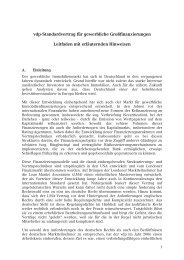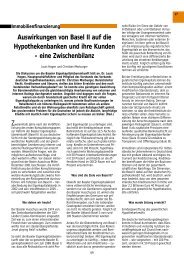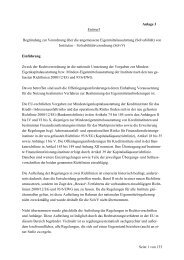The Pfandbrief 2011 | 2012
The Pfandbrief 2011 | 2012
The Pfandbrief 2011 | 2012
You also want an ePaper? Increase the reach of your titles
YUMPU automatically turns print PDFs into web optimized ePapers that Google loves.
Regulation of rating agencies: Time for new priorities?<br />
Accepting External Ratings of Other Agencies<br />
<strong>The</strong> agencies’ refusal to recognise external ratings by other rating agencies has been criticised.<br />
Take derivatives, for example. Derivatives for hedging interest-rate and exchange-rate<br />
risk on <strong>Pfandbrief</strong>e and the corresponding cover assets are recognised by the agencies only if<br />
the derivative partner also has a rating from the relevant agency. At a time when many banks<br />
no longer receive ratings from all three rating agencies, not least because of cost considerations,<br />
this requirement soon proves to be a hindrance.<br />
Moreover, the agencies require what is known as a contractual replacement, under which<br />
the derivative contracts must stipulate that the derivative partner must search for a new derivative<br />
partner, if it is no longer able to satisfy certain rating requirements itself. This “replacement<br />
derivative partner” must also have a rating from the agency. This approach is also likely<br />
to be problematic, at the very least, in terms of competition law.<br />
<strong>The</strong> interim conclusion is that it is time to reform the existing Regulation governing rating<br />
agencies by setting new priorities. In addition to increasing transparency with respect to the<br />
models used, the agencies need to concentrate much more on communicating with other market<br />
participants. <strong>The</strong> agencies’ refusal to recognise external ratings by third parties also needs<br />
to be addressed.<br />
80<br />
No Compulsory Additional Rating<br />
However, the goal of avoiding conflicts of interest has been addressed as comprehensively as<br />
possible in the Regulation, given the existing rating system. In our view, compulsory rating by<br />
at least two agencies, which is currently under discussion, will not lead to any improvement.<br />
We believe that this is the wrong approach, as it would increase even more the significance of<br />
external ratings for regulatory purposes without providing sufficient benefits in return. Finally,<br />
it would push up the costs and expenses of the institutions concerned. Such a requirement<br />
would not increase competition either, since one of the three established agencies would probably<br />
be commissioned to provide the second rating. Even if, as occasionally suggested, a foundation<br />
were made responsible for awarding the rating contract, it would still be impossible to<br />
avoid the established agencies. Because rating agencies rely on their good reputation and their<br />
track record, a new agency would first have to develop both of these. It is inconceivable that a<br />
foundation could compel issuers to award a rating contract to an unknown agency. <strong>The</strong> same<br />
situation would arise if, as proposed alternatively, a rating foundation were set up to compile<br />
its own ratings. Even a foundation of this kind would first have to develop a reputation for itself<br />
before it would be able to provide ratings profitably or, at least, on a break-even basis. At the<br />
same time, an attempt to develop a new agency should not be condemned to failure from the<br />
outset.
















